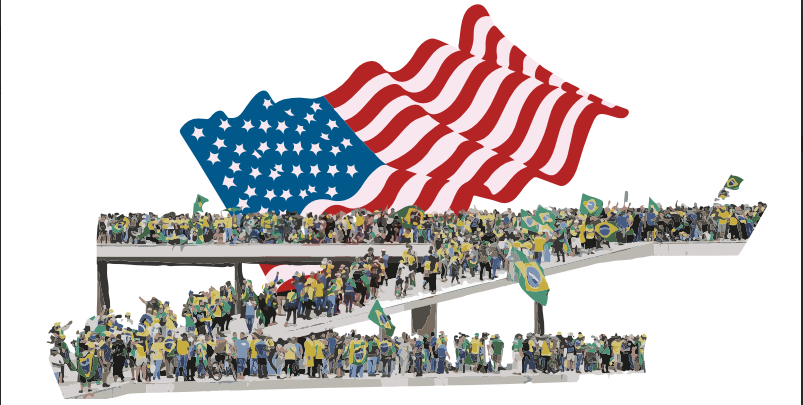Editorial: America and Global Democracy
How the United States Impacts International Politics
March 6, 2023
On Jan. 6, 2021, Americans witnessed a historical anomaly in the United States’ democratic political process: a mob of former President Donald Trump’s supporters, convinced that the results of the previous year’s presidential election were illegitimate, broke into the nation’s capitol and attempted to prevent the certification of said results by a joint session of Congress. The event precipitated widespread public distress about the future of American democracy, triggered a second impeachment of former President Trump, and prompted the creation of a select committee by the House of Representatives to investigate the attack (which released its report on Dec. 22, 2022). Internationally, the leaderships of more than 70 countries expressed concern over the riots.
Notably not among the ranks of those international leaders condemning the Jan. 6 riots was President of Brazil Jair Bolsonaro, long an ally of former President Trump and fellow practitioner of populist right-wing politics. Though concerns over President Bolsonaro’s commitment to democratic principles are long-standing, they boiled over in the winter of 2022-2023 with Bolsonaro’s response to his defeat in Brazil’s presidential election at the hands of Luiz Inácio Lula da Silva, more commonly known as Lula. Like former President Trump, President Bolsonaro had made cryptic and unfounded warnings of fraud prior to the election and entertained doubt about its legitimacy after the results came back in his opponent’s favor. These similarities are not mere coincidences, but signifiers of a concerning development in the global democratic movement.
As the oldest continuing republic in the world, the United States is in a unique position to influence the character of international democracy. Though the outgrowing tendency of American popular government can be traced back to the expansionism of the 19th century, the U.S. did not begin to come into its modern role on the global stage until the end of the Second World War. With the isolationism of the early 20th century decisively broken, the U.S. took on a leading role in determining the trajectory of post-war Europe and Asia. In addition to providing funds to rebuild in the wake of the war’s destruction, America helped to draft the constitutions of former Axis countries, including Germany and Japan, enshrining in them representative democracy. Since then, the U.S. has served as somewhat of a pacesetter for the free world, with even domestic decisions making international waves.
It is no surprise, then, that the effects of the largest upheaval in American democracy in decades, were not confined within the borders of the United States. Though the overwhelming international response was condemnation, former President Trump’s supporters found some fellowship in the leadership of nations like Hungary, Poland, and Brazil. It is also unsurprising that President Bolsonaro, who often aligned himself with former President Trump on matters of policy and personal style, chose to adopt his American counterpart’s approach to electoral defeat. What is shocking and concerning is how readily and easily President Bolsonaro’s supporters, so-called “Bolsonaristas,” carried out a physical attack on Brazil’s governing institutions just over two years after the Jan. 6 riots brought the threat of populism to the attention of the world. Though the riots in Brasilia were not a one-for-one reproduction of the attack on the United States Capitol, it is difficult to miss the parallels between the two events.
Though the similarities between the riots in Washington, D.C., and Brasilia are largely self-evident, they are worth restating. Both events were precipitated by months of electoral doubt-casting by right-wing populist presidents, who appeared to have anticipated their losses beforehand and sowed suspicion about the legitimacy of their nations’ elections in preparation. Both occurred in the midst of widespread misinformation and disinformation, most notably on social media such as Facebook and Twitter and on messaging platforms like Whatsapp and Telegram. There is even some overlap between the principal actors in each incident. Eduardo Bolsonaro, son of the former Brazilian president, has worked with Steve Bannon, former President Trump’s former advisor and far-right media mogul, since 2019.
The two riots are not, however, identical. Brazilian reporters, including Raphael Tsavkko Garcia of Al Jazeera, have pointed out that the Brasilia riots were apparently more extensively coordinated over a longer period of time (with discussions of insurrection appearing on platforms like Facebook and Telegram months prior) than those on Jan. 6, 2021. What’s more, evidence suggests that members of the Military Police and Brazilian Armed Forces supported the riots and in some cases helped to organize them. On the other hand, President Bolsonaro notably did not pursue his claims of election fraud with nearly the same intensity as former President Trump, and was quicker to condemn the Brasilia riots than former President Trump was to reproach his own supporters on Jan. 6. Nonetheless, the similarities and connections between the two are cause for concern, especially in a world where right-wing populism has gained footholds in nations across the globe.
In the aftermath of the Brasilia Jan. 8 riots, the United States has a responsibility to examine its role on the global stage and the effects of its internal politics on international democracy. According to the Eurasia Group Foundation, in recent years, support for American influence has waned in countries traditionally allied with the US (such as Germany), while increasing in countries led by right-wing populists with authoritarian tendencies (including India and Hungary). While there are no easy solutions to the rising tide of democratic illiberalism, the United States can start by holding accountable those responsible for attacks against democratic principles, including enacting legal repercussions for those who attempted to overturn the 2020 presidential election. In addition, steps must be taken to curb online disinformation and monitor social media content that could incite repeats of the Jan. 6 attacks. Finally, individual Americans can inform themselves on the inner workings of our democracy and participate in efforts to restore faith in the electoral system. It is imperative that the American republican government continue to thrive, as we remain one of the bellwethers of global democracy.












